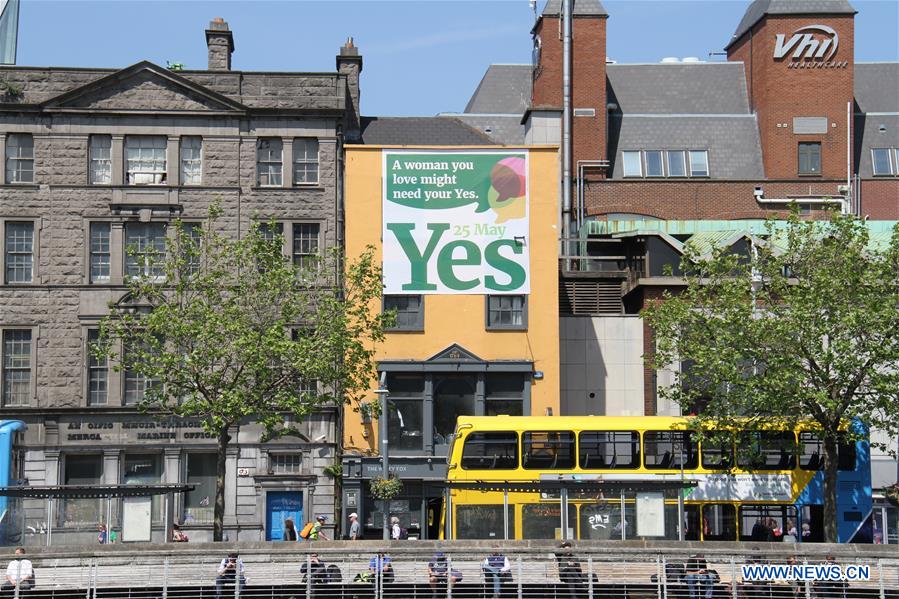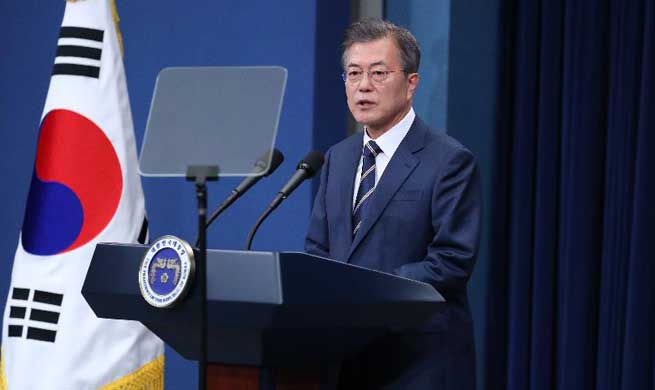
A huge poster for legalized abortion is seen on a building in downtown Dublin, Ireland, May 25, 2018. Nearly 70 percent of Irish voted to abolish Ireland's longtime abortion ban in a Friday referendum, according to an exit poll. (Xinhua/Zhang Qi)
DUBLIN, May 26 (Xinhua) -- Hundreds of people, mostly women gathered in the court of an 18th century government building complex in the downtown area of the Irish capital Dublin on Saturday evening.
They burst into cheers, some of them even tears when a returning officer declared that the majority of the voters in the country's Friday abortion referendum had voted Yes for scrapping a law that has virtually banned abortions in the country for more than three decades.
According to the final results of the referendum announced by the returning officer Bary Ryan at Dublin Castle, which is temporarily made as a central count center of the referendum, 64.1 percent of the people out of the nearly 3.37 million registered voters turned out in Friday's 15-hour voting at some 6,500 polling stations across the country. 66.4 percent of the voters cast their Yes ballots for repealing the Eigth Amendment with the No vote rate standing at 33.6 percent.
The Eighth Amendment, or simply called the eighth by locals, is an article written into the Irish constitution after a 1983 referendum, which stresses equal importance of right to life for the unborn child and its mother and does not permit abortions unless the life of the mother is in danger or the foetus is proven by doctors to be dead before or shortly after birth.
Due to the strict abortion laws in Ireland, many pregnant women, especially those who get pregnant because of rape and incest or face foetal abnormalities in development, either have to travel to the neighbouring country of Britain for terminations of pregnancy or secretly take abortion pills sought illegally without proper counselling or medical care.
Statistics released by the Irish government officials say that each year over 3,000 Irish women have to take a flight or a boat to travel abroad for abortions and an estimated 170,000 Irish women have reportedly received abortions overseas since 1980s.
Abortion has become a serious social issue in Ireland and also a reality in the country despite the constitutional ban on it. That explains why the turnout of the Friday's referendum is much higher than many of the previous referendums held in the country, local media quoted experts as saying.
Talking to local media while visiting his constituency in Dublin West on Saturday afternoon, Irish Prime Minister Leo Varadkar said that Friday's referendum marked a culmination of "a quite revolution" which has taken place in the country over the last few decades.
He also said that a modern Ireland needs a modern legislation.
Mary Lou McDonald, the female leader of the Ireland's third largest party Sinn Fein said that "We have without doubt done right by Irish women for this generation and many to come."
Mary Lou's view was also echoed by Irish second largest party Fianna Fail leader Micheal Martin who said that the Irish people had made the right decision and it would mean better care for women in Irish hospitals.
Irish fourth largest Labour Party leader Brendan Howlin also shared the same view. He said the Irish women had been denied security and protection at crucial points in their lives over the 35 years.
"We have denied them dignity too," said Howlin, adding that "Today is a levelling day for them and it is very much a cause for celebration."
All the leaders of the major opposition parties in Ireland have expressed their support for changing the country's abortion laws despite the fact that some of their party members, especially those who are parliamentarians, are against the change of the constitutional ban on abortions.
Varadkar said the new abortion legislation is expected to be passed by the Irish parliament by the end of this year as it will go through legal procedures and many technical things need to be sorted out before the new law get enacted.
Local experts said that pregnant women in Ireland can not get immediate access to abortion services after the referendum and abortion is still strictly restricted before the enaction of the new abortion law, But they can continue to receive abortions abroad, they said.

















